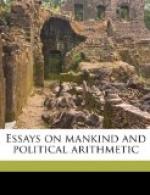But we in England have taken another course, laying a fine upon the marriage bed, which seems small to those who only contemplate the pomp and wealth round about them, and in their view; but they who look into all the different ranks of men are well satisfied that this duty on marriages and births is a very grievous burden upon the poorer sort, whose numbers compose the strength and wealth of any nation. This tax was introduced by the necessity of affairs. It is difficult to say what may be the event of a new thing; but if we are to take measures from past wisdom, which exempted prolific families from public duties, we should not lay impositions upon those who find it hard enough to maintain themselves. If this tax be such a weight upon the poor as to discourage marriage and hinder propagation, which seems the truth, no doubt it ought to be abolished; and at a convenient time we ought to change it for some other duty, if there were only this single reason, that it is so directly opposite to the polity of all ages and all countries.
In order to have hands to carry on labour and manufactures, which must make us gainers in the balance of trade, we ought not to deter, but rather invite men to marry, which is to be done by privileges and exemptions for such a number of children, and by denying certain offices of trust and dignities to all unmarried persons; and where it is once made a fashion among those of the better sort, it will quickly obtain with the lower degree.
Mr. King, in his scheme (for which he has as authentic grounds as perhaps the matter is capable of) lays down that the annual marriages of England are about 41,000, which is one marriage out of every 134 persons. Upon which, we observe, that this is not a due proportion, considering how few of our adult males (in comparison with other countries) perish by war or any other accident; from whence may be inferred that our polity is some way or other defective, or the marriages would bear a nearer proportion with the gross number of our people; for which defect, if a remedy can be found, there will be so much more strength added to the kingdom.
From the books of assessment on births, marriages, &c., by the nearest view he can make, he divides the 5,500,000 people into 2,700,000 males and 2,800,000 females; from whence (considering the females exceed the males in number, and considering that the men marry later than women, and that many of the males are of necessity absent in the wars, at sea, and upon other business) it follows that a large proportion of the females remain unmarried, though at an adult age, which is a dead loss to the nation, every birth being as so much certain treasure, upon which account such laws must be for the public good, as induce all men to marry whose circumstances permit it.
From his division of the people it may be likewise observed, that the near proportion there is between the males and females (which is said to hold also in other places) is an argument (and the strongest that can be produced) against polygamy, and the increase of mankind which some think might be from thence expected; for if Nature had intended to one man a plurality of wives, she would have ordered a great many more female births than male, her designments being always right and wise.




